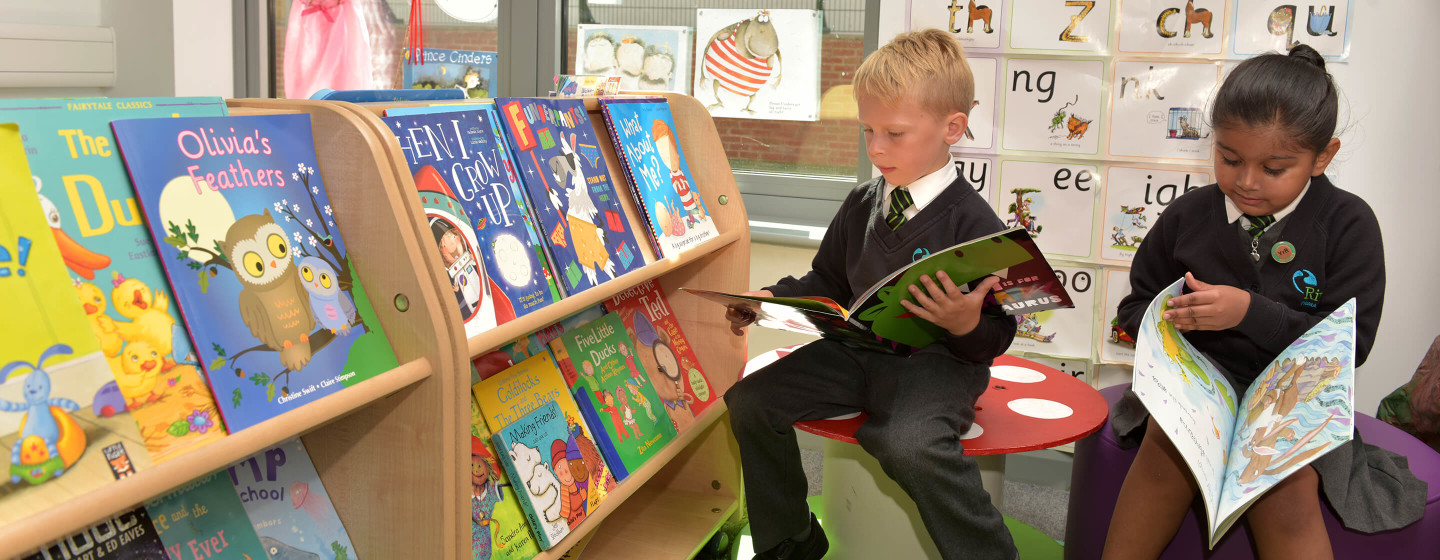Rivers Primary Academy praised in Ofsted report Learn More

Early Reading and Phonics
Our vision
Our vision is:
All children in our school will leave as fluent, confident readers with excellent comprehension skills to prepare them for the next stage in their education. We will also nurture a passion for reading, broadening our children’s minds and horizons.
Phonics
At Rivers, we teach phonics systematically from nursery to year 2 for half an hour each day of the week through the Read Write Inc Programme. Children are assessed every 6 weeks by the phonics lead and placed into homogeneous groups depending upon their phonetic decoding skills.
Phonics Sessions
Each group is led and taught by a RWI trained member of staff. During every session, the teacher delivers content appropriate to the group’s reading level. Some sessions solely focus on the teaching of the Set 1 speed sounds, others focus on a sound alongside a ditty or storybook which is changed weekly. The phonics session is broken up into 2 parts. The first part of the lesson lasts for 10-15 minutes and is referred to as the ‘speed sounds’ part of the lesson. The second part (depending on the group’s ability) allows the children to read their in-school RWI book practising their fluency and comprehension skills.
Pinny Time
‘Pinny Time’ happens at 5 points throughout the day. This is an opportunity for the children to quickly read and practise their speed sounds as their teacher flashes through them. Pinny time can be targeted (1:1 or in a small group) or the brief whole class teaching of a sound.
Raising Standards Meetings
The Rivers RWI team meets regularly for a training session led by the RWI leader. This session celebrates the progress and teaching pepitos identified during the RWI leader’s weekly drop-ins of phonics lessons. The session is also used to further improve and develop the teaching of phonics. A focus is shared with the team which is modelled and practised in the session supporting members of staff to implement and improve their own phonics teaching over the following weeks.
Supporting the lowest 20% of readers
We are informed of our bottom 20% of readers through RWI assessments, mock phonic screening and through our professional teaching judgments. These children are supported through 1:1, or small group, coaching with a RWI trained member of staff each afternoon of the week for approximately 10 minutes. This is an intervention which is specific to each individual child depending upon their reading ability and next steps.
For those children who leave key stage 1 having not achieved the statutory phonics screening daily phonics sessions continue, where appropriate. These children are also identified by the SENCO and additional further support is put in place as needed to remove barriers to reading for that child.
In Key Stage 2 children whose reading age is significantly below ARE (more than 2 years) are placed on our 121 fluency reading programme providing them with the opportunity to further develop their speed, accuracy, expression and phrasing by reading with a teacher daily.
Whole Class Reading
Daily whole class reading sessions are delivered from nursery to year 6.
Windsor Academy Trust’s primary reading spine has been created to ensure that during the primary phase of their education all children in our trust are introduced to a wide range of high quality texts to nurture a love of reading. These texts will provide children the opportunity to explore beyond the populist authors of current day and broaden their literary horizons. All texts have been purposefully selected to provide high challenge for our children in order to stimulate aspirations and own reading journey.
Creation of the reading spine has been a collaborative process across trust schools and teachers within, input was also provided from our secondary English colleagues. Additionally, we have also fused best practice within other trusts and schools where whole class reading is already successfully embedded leading to exceptional results.
When creating the spine, a variety of considerations were made: whether contemporary or classic; the setting of; themes covered; period set; type of narrative and the makeup of the main characters. This will ensure broad and breadth within reading and support meeting the diverse interests of a class.
Home reading
Along with the RWI book the children read in their phonics session, each child takes home a RWI Book Bag book. These books are given out and changed each week during the RWI lesson by their RWI teacher. This book matches the phonetic ability of the child and the book that they are reading in school.
In Key Stage 2 children have access to a wide range of texts and are guided and supported by their Accelerated Reader level in making appropriate choices in selecting their reading book.
Children are expected to read at least five times a week and record this in their planners. To support children’s comprehension and parental engagement our planners are pre-populated with age-appropriate questions.
Nurturing a love of reading
A regular programme of reading events across the year develops children’s love for reading. Our vibrant library, managed by our student librarians, provides a treasure trove of books for children to broaden their literary horizons. Teachers also share a class read at the end of each day.
Assessment
All children complete the statutory reading assessments (Year 1 Phonics Screening, Key Stage 1 Reading SAT, Key Stage 2 Reading SAT). We also use termly NTS reading assessments to support our children’s confidence in accessing and completing statutory assessments. These assessments are also used by teachers to inform their WCR planning.

